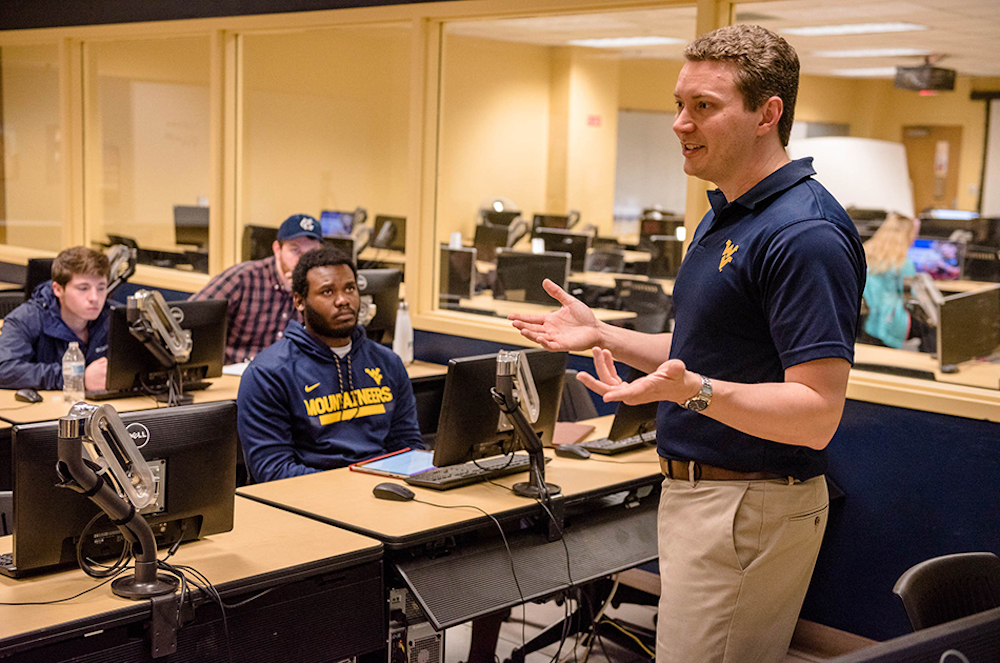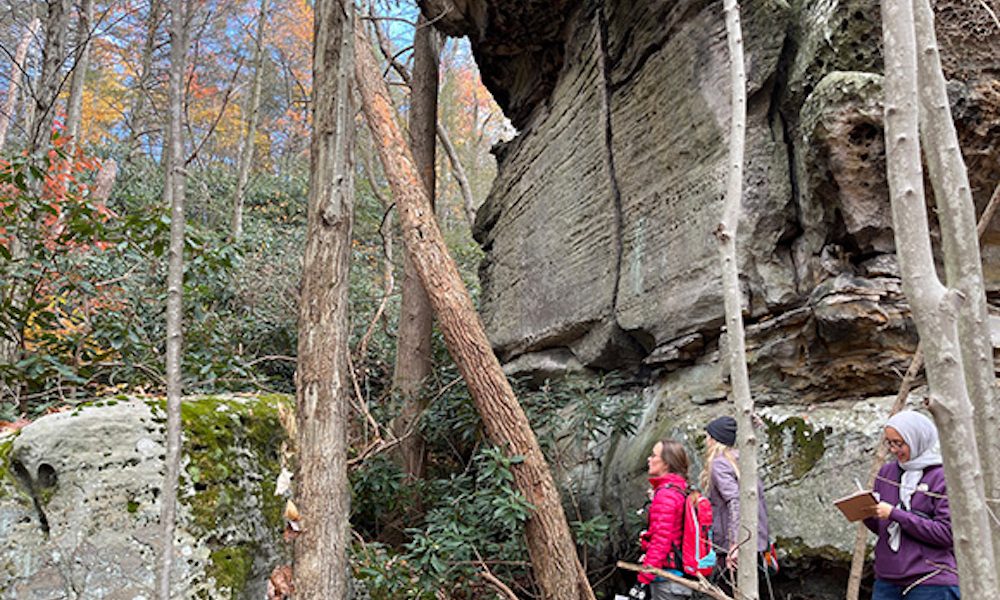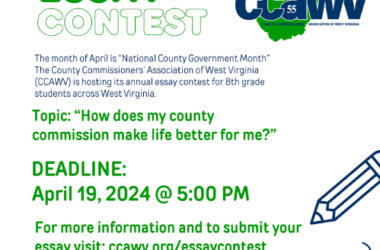MORGANTOWN, W.Va. — West Virginia University campuses are teeming with experts in a variety of fields working on compelling research with the capacity to change lives and communities.
From building up outdoor recreation throughout the state, to crunching vital numbers for its small communities, to exploring ways that small businesses can best market their goods and services, WVU is serving as a community development catalyst in real time and making significant change at ground levels.

(Editor’s Note: This is the second in a series of news releases highlighting ways WVU is serving the Mountain State. Access photos, video and additional resources in a Media Toolkit from WVUToday.)
Trail transformation
The Brad and Alys Smith Outdoor Economic Development Collaborative is helping lead a reimagining of the state’s outdoor economy one community at a time.
“The Smith OEDC embodies the concept of serving West Virginia,” said Danny Twilley, assistant vice president of economic, community and asset development for the Collaborative. “Everything we do focuses on utilizing the many assets here to advance the Mountain State’s economy, to improve the lives of the people living here and to celebrate what it means to live in this incredible place. Through outdoor recreation and community development, talent attraction and retention and youth development programs, we take serving this state to heart, and make strides each day through our efforts.”
Vaike Haas, associate professor of landscape architecture in the Davis College of Agriculture, Natural Resources and Design who has been on the front lines of OEDC’s work, loves finding gaps and thrives in the “visionary part” of impacting communities. Her work transformed an unused, more than 60-acre parcel of University land into the Falling Run Greenspace, and she’s not stopping there.

“The International Mountain Biking Association gave us the largest trail accelerator grant to date at that time, and that award really demonstrated on a national level that this community had potential in developing outdoor recreation,” she said. “It also brought us closer to achieving the Collaborative’s goal of bringing trails within one mile of every home in Morgantown. Our trail work is transformative and tremendous for local economies. We have all these natural resources that aren’t crowded already like other places, and we’re getting into this early enough that we can really think this through.”
When she’s not designing entire trail systems, Haas focuses on influencing public policy governing pedestrian and bike infrastructure, especially safe routes to school. She is currently studying the best walking routes to Suncrest Elementary and Suncrest Middle School in Morgantown. If her interventions are effective, there are plans to possibly implement them across the state to promote walking to school.
“With these efforts, we’re addressing chronic disease by increasing physical activity, improving safety, reducing the possibility of motor vehicle-related injuries and fatalities and reducing transportation’s contribution to air pollution in our communities,” she said. “WVU has willing volunteers, a service attitude and a land-grant mission. That’s the perfect combination to make real change happen.”
Forecasting community development
An innovative class in the John Chambers College of Business and Economics taught by economic forecaster and analyst John Deskins is in its sixth year of serving communities throughout the state.
Applied regional economic research first rolled out in 2018 enrolling around 10, hand-picked students. That group spent the semester digging deep into the economies of the Huntington, Parkersburg and Potomac Highlands regions with a goal for each student group to produce a publishable regional economic outlook for the partner communities. The course aimed to provide an innovative learning experience and to extend the reach of the WVU Bureau of Business and Economics Research, of which Deskins serves as director. Not only did the student’s research provide economic forecasting for the regions, but it also became part of the Bureau’s official statewide data.
“This class is really a win-win for the students and for West Virginians,” Deskins said. “The course teaches the students how to conduct a careful and professional regional economic analysis and forecast. This is a valuable skill for a budding economist or data analyst. The people in each region of the state that is the subject of these economic outlook reports gain valuable and detailed information regarding the challenges and opportunities associated with economic development in their region.”
Isabelle Dallaire, a senior economics major from Manassas, Virginia, completed Deskins’ forecasting class last spring. She was part of a three-person group that closely studied the Weirton economy and said she thought the information they collected and shared with stakeholders was important for the economic growth of the area.
“I feel that this is really where we can give back to the community,” Dallaire said. “These forecasts give community members a look into a potential future, something that can look even better if the correct policies are in place. Parts of our report also covered findings on why certain trends are happening, which also gives business owners ideas on how to attract more people, whether those people are customers or potential employees. It is a lot of information, not all of which is readily available without paying for it.”
Change agency
The Reed College of Media has an in-house advertising and public relations agency providing its students with real-world professional experience rivaling some of the biggest agencies in the country. The Martin Hall Agency works with communities, organizations, businesses and people of West Virginia, to deliver “next-generation solutions.” The work also focuses on giving back to communities, pushing boundaries and breaking down barriers.
Geah Pressgrove, associate professor and advertising and public relations program chair, draws continuous inspiration from the agency’s students.
“I have a passion for helping students become more civically engaged and I tell them often that our work may not change the world, but we definitely change the lives of the people, businesses and organizations we work with,” Pressgrove said. “You just never know what the trickle-down effects are going to be from that work.”
During the fall 2022 semester, Martin Hall Agency students were involved in three projects benefiting the state.
Students worked on promoting 200 agritourism and farm-based experiences found only in West Virginia to outside visitors, encouraging them to stay an extra day to explore places off the beaten path. Another group promoted the state’s burgeoning cider industry with their “Seed. Swig. Smile.” campaign and learned about the important role of cider in the state’s history. The third group launched a “Truly Local” campaign targeting West Virginia residents and promoting agritourism experiences right in their own backyards.
“These are truly transformational experiences for students and the individuals and businesses that they get to work with,” Pressgrove said. “The Martin Hall Agency is a superb example of the many ways WVU utilizes its talented community and the many assets on campus to positively impact our state.”
Empowering future leaders
WVU Extension has boots on the ground in every West Virginia county and community development is central to its mission across the state. Its “My Hometown is Cool” program is just one example of the innovative ways Extension’s work can have a lasting impact.
The program was developed to provide young people with opportunities to learn about community development and use their ideas, creativity and commitment to help drive change with the help of mini grants. Teams of two or more pitch ideas for making their hometowns even cooler, guided by an adult coach. WVU Extension and the Chambers College of Business and Economics select the winners and award the grants.
In 2021, four areas benefitted from the program — Greenbrier, Marshall, McDowell and Nicholas counties, and following the summer 2022 selection process, Brooke County was added to that list when two teens suggested renovating a forgotten area of Brooke Hills Park into a safe teen hangout space. The selection process is currently underway for the next round of youth projects.
“One thing that this project taught me is that this was never about pickleball,” said Ryan Vaughan, a 2021 finalist from Greenbrier County whose team installed four permanent pickleball courts at Hollowell Park in Lewisburg with their mini grant. “This was never about this park. This project, the only purpose this really had, was to give back to a place that’s given us so much.”
Read more about how WVU serves West Virginia.
-WVU-
hlt/02/08/23
MEDIA CONTACT: April Kaull
Executive Director of Communications
University Relations
304-293-3990; [email protected]







